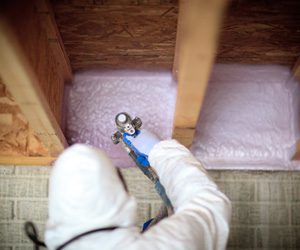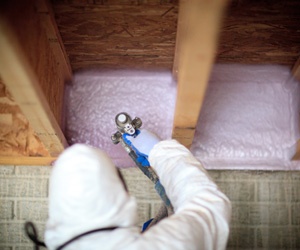Updated January 2024

Did you know your basement is a major source of energy loss in your Grand Rapids home? It’s true. Located around the perimeter of your basement ceiling, where the walls of your home meet the foundation, are the culprits: your basement box sills and rim joists. These areas are some of the thinnest points in a home’s exterior and allow outside air to easily leak into your basement, increasing heat loss during the winter.
Poorly insulated basement box sills add to the problem, making the space feel even colder. Without proper insulation and air sealing, the unconditioned outside air, both cold and hot, enters your home through these areas, putting extra strain on your HVAC system. As a result, your HVAC system must work harder to keep your home’s first floor at an ambient temperature throughout the year, affecting your energy bills.
Let’s explore why insulating and air sealing your basement box sills and rim joists is the best way to create not only a more inviting, usable basement, but ultimately, a more comfortable, energy efficient home as well.
Benefits of Box Sill Insulation
There are many benefits to properly insulating your box sills and rim joists. As a homeowner you can enjoy:
Energy Efficiency
When you properly insulate and air seal your box sills and rim joists, you’ll significantly prevent heat loss from your basement, forming a barrier that reduces the workload on your HVAC system, lowers your energy bills and creates a more sustainable home.
Comfort
Eliminating air leaks is the key to unlocking improved home comfort. Basement box sill insulation, when combined with the use of caulk or spray foam, seals air leaks that have been allowing outside air to infiltrate your home.
Moisture Control
Basements are notorious for moisture-related issues that can lead to mold growth and damage. Properly insulated box sills and rim joists act as a barrier against moisture infiltration, protecting your home’s structural integrity and home exterior while also creating a healthier living environment without mold and mildew.
Pest Deterrence
Your often-neglected box sills and rim joists can be convenient entrance points for pests, including spiders, bugs, and other creatures seeking shelter. Proper insulation creates a deterrent to keep pests and rodents out of your home. It’s an official “no pests allowed” sign on your basement.
Types of Insulation Materials
The choice of material you choose to insulate your basement matters. Consider every aspect of the material, including its sustainability and effectiveness. Fiberglass, rigid foam board, and spray foam insulation are all common choices for the job, and each comes with its own set of pros and cons.
- Fiberglass is the most cost-effective option and meets local building codes but fails to seal the air leaks around your basement box sills, making it better suited for other areas of your home.
- Rigid foam board is another affordable choice but is harder to install than spray foam and more time consuming.
- Spray foam insulation, while the most expensive option, insulates and seals air leaks in one step, unlike the other materials.
DIY vs. Professional Installation
While DIY projects can be tempting, the benefits of professional installation cannot be overstated when it comes to basement insulation. Hiring a contractor ensures the job is done correctly, adhering to safety considerations and best practices. Given the intricacies of sealing air leaks and insulating your basement ceiling, it’s wisest to leave this task to the experts. DIY inexperience can often lead to installation and performance issues that will cost you more money in the long run.
Cost Analysis and ROI
Investing in basement box sill insulation and air sealing is an investment in your home’s future. Even with the initial cost involved, the return on investment is substantial. The biggest factors that affect your basement insulation cost are the size of the area to be insulated and the material being used to insulate and air seal. Lower energy bills, increased home value, and potential long-term savings make box sill insulation a wise financial decision.
Maintenance and Upkeep
To maximize the benefits of your basement box sill insulation, regular maintenance and inspections are essential. Look for signs of wear or damage and address them promptly to ensure your insulation continues to perform at its best.
Trust the Insulation Experts at Whitson Insulation Company

Don’t let your cold, creepy basement have the last word. Let us help you turn it into a place you can enjoy. Both your home and family will appreciate the decision to insulate your basement box sills, especially during a rough Michigan winter. To ensure the job is done right, make sure you hire a qualified, insured and experienced spray foam contractor to do the job right and properly insulate and air seal your box sills and rim joists, such as Whitson Insulation Company.
At Whitson, we have been committed to doing things right on every project since 1978. Our expert team provides quality insulation products and services to new construction, commercial, and existing home customers throughout Grand Rapids and western Michigan. We look forward to making your basement (and entire home) more comfortable and energy efficient year-round. Contact us today to schedule your free estimate and speak with one of our insulating experts.

